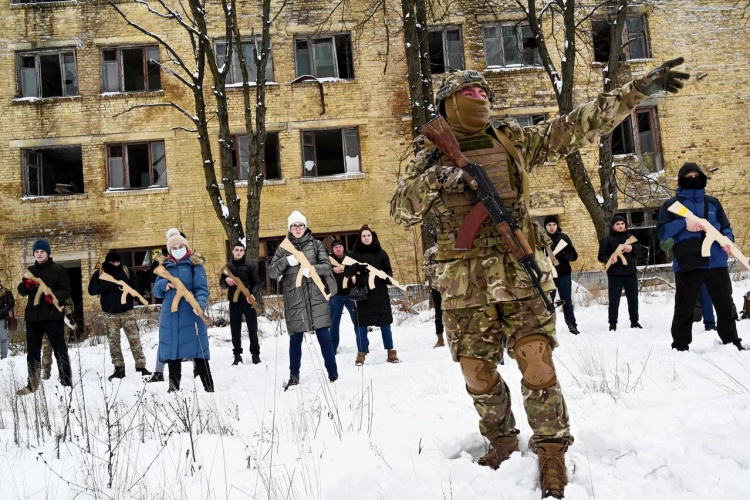The United States and Britain on Sunday flagged new and “devastating” economic sanctions against Russia, as Washington and its NATO allies step up efforts to deter any invasion of Ukraine.
 |
|
A military instructor teaches civilians holding wooden replicas of Kalashnikov rifles, during a training session at an abandoned factory in the Ukrainian capital of Kyiv on January 30, 2022. Photo by AFP |
Fears of an imminent invasion have grown in recent days, despite denials from Moscow and pleas from Ukraine’s president to avoid stirring “panic” over the massive Russian military build-up on the border.
Amid a flurry of diplomatic contacts, US Undersecretary of State Victoria Nuland said a proposal on security issues presented last week by the US and NATO to Russia may have stirred interest in Moscow.
“We’ve heard some signs that the Russians are interested in engaging on that proposal,” Nuland said on CBS, including the likelihood of new talks this week between Secretary of State Antony Blinken and his Russian counterpart, Sergei Lavrov.
The chairman of the Senate Foreign Relations Committee, meanwhile, took a tough stance, saying it was crucial that the United States send a powerful message to Russian President Vladimir Putin that any aggression against Ukraine would come at a very high cost.
“We cannot have a Munich moment again,” Senator Bob Menendez said on CNN. “Putin will not stop with Ukraine.”
He indicated some penalties could be levied over actions Russia has already taken in Ukraine, including cyberattacks, but that “devastating sanctions that ultimately would crush Russia” would come if Moscow were to invade.
Nuland said the White House is working closely with the Senate, and that any sanctions measures would be “very well-aligned” with those coming from European allies.
Putin “will feel it acutely, as will the Russian people,” she said.
In London, Foreign Secretary Liz Truss said Britain would unveil sanctions legislation next week targeting “a much wider variety” of Russian economic targets.
“There will be nowhere to hide for Putin’s oligarchs,” Truss told Sky News.
But she cautioned that European allies must remain united in deterring Moscow, and not place “immediate financial issues” over the defense of “freedom and democracy.”
Analysts say an array of sanctions hitting Russian banks and financial institutions would not only affect daily life throughout Russia but could roil major economies in Europe and elsewhere.
Carrots and sticks
Western leaders are continuing to pursue a two-pronged approach, stepping up military assistance to Ukraine but also undertaking a full-court diplomatic effort to defuse the crisis.
Britain is preparing to offer NATO a “major” deployment of troops, weapons, warships and jets, Prime Minister Boris Johnson announced Saturday. At the same time, he is expected to speak with Putin next week.
NATO Secretary-General Jens Stoltenberg on Sunday welcomed the increased military support while also endorsing London’s diplomatic initiative.
With tensions rising, Canada on Sunday announced the temporary repatriation of all non-essential employees in its Kyiv embassy. And its defense minister, Anita Anand, said Canadian forces in Ukraine were protectively being moved west of the Dnieper River.
Relations between Russia and the West are at their lowest point since the Cold War.
But Russia has repeatedly denied posing a threat to the onetime Soviet republic and said Sunday that it wants “respectful” relations with the United States.
“We want good, equal, mutually respectful relations with the United States, like with every country in the world,” Foreign Minister Lavrov told Russian TV.
He added, however, that Russia does not want to remain in a position “where our security is infringed daily.”
Citing NATO’s presence near its eastern border, Russia has put forward security demands to Washington and the U.S.-led military alliance.
They include a guarantee that NATO will not admit new members, in particular Ukraine, and that the United States will not establish new military bases in ex-Soviet countries.
Russia has also demanded a pullback of NATO forces deployed to eastern European and ex-Soviet countries.
Can’t ‘afford to panic’
In the face of the Russian build-up, Ukrainian President Volodymyr Zelensky has called on the West to tone down the rhetoric.
That plea, from a country also eager for Western support — particularly since Moscow seized Crimea in 2014 and began fueling a deadly separatist conflict in the east of the country — has raised eyebrows in Washington.
Ukrainian Ambassador Oksana Markarova tried to reassure Americans on Sunday, telling CBS that Ukraine is “grateful for the United States,” but that after eight years of living with a constant threat from Russia, “we cannot afford to panic.”
Kyiv’s Foreign Minister Dmytro Kuleba urged Russia in a tweet to pull back its forces and “continue diplomatic engagement” if it is “serious” about de-escalating tensions.
Amid the ongoing diplomatic contacts, Putin spoke with French President Emmanuel Macron on Friday.
And senior officials from France, Germany and Poland are expected to visit Ukraine in the coming days.
- Reduce Hair Loss with PURA D’OR Gold Label Shampoo
- Castor Oil Has Made a “Huge” Difference With Hair and Brow Growth
- Excessive hair loss in men: Signs of illness that cannot be subjective
- Dịch Vụ SEO Website ở Los Angeles, CA: đưa trang web doanh nghiệp bạn lên top Google
- Nails Salon Sierra Madre
 VnExpress News The News Gateway of Vietnam
VnExpress News The News Gateway of Vietnam





